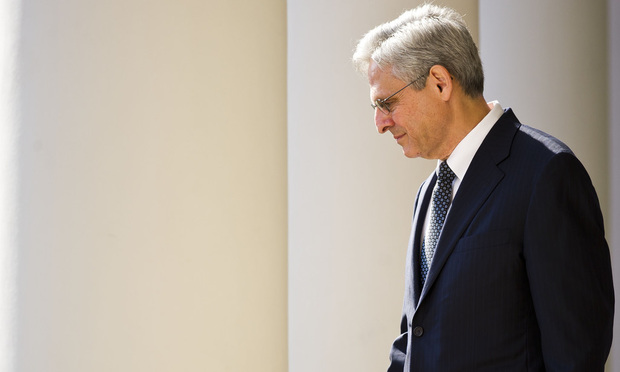How the Judiciary Changed Conduct Rules to Pierce Culture of Confidentiality
“We are not done,” said Chief Judge Merrick Garland of the U.S. Court of Appeals for the D.C. Circuit. “We won't be done until we do everything we can do.”
March 13, 2019 at 10:25 AM
4 minute read
 Chief Judge Merrick Garland, of the U.S. Court of Appeals for the D.C. Circuit. Credit: Diego M. Radzinschi / NLJ
Chief Judge Merrick Garland, of the U.S. Court of Appeals for the D.C. Circuit. Credit: Diego M. Radzinschi / NLJ
Responding to complaints that the culture of the federal judiciary makes it difficult for employees to lodge complaints of misconduct, the Judicial Conference on Tuesday promulgated significant changes to the code of judicial conduct that govern judges and court employees.
“We are not done,” said Chief Judge Merrick Garland of the U.S. Court of Appeals for the D.C. Circuit, who met with reporters after the conference acted. “We won't be done until we do everything we can do.”
Garland said a range of new procedures, including anonymous reporting, employee hotlines, and enhanced training will be deployed to enable law clerks and other court employees to seek guidance and register complaints without fear of retaliation.
Perhaps the most significant change is relegating the pervasive tradition of confidentiality between judges and their clerks to secondary status, eclipsed by the importance of enabling clerks to complain if their bosses behaved inappropriately.
In December 2017, a handbook for federal law clerks that said “law clerks owe judges complete confidentiality in case-related matters” was amended to make it clear that nothing in the handbook prevented clerks or other employees from reporting judicial misconduct.
The importance of confidentiality in judges' chambers “does not and cannot extend to issues of misconduct and the reporting of misconduct,” Garland said Tuesday.
It was confidentiality that Judge Alex Kozinski invoked to silence clerks who were victims of his sexually charged interactions with female clerks, until some went public in 2017. He abruptly retired in December 2017, issuing a statement that “It grieves me to learn that I caused any of my clerks to feel uncomfortable.”
The scandal shook the judicial branch and prompted Chief Justice John Roberts Jr., who presides over the Judicial Conference, the judiciary's policymaking arm, to launch an overhaul in the way the judiciary operated as the #MeToo movement spread across the nation.
The most tangible result of Roberts' effort came Tuesday with the first changes in the judiciary's code of conduct in five years. The code does not bind Supreme Court justices, though at a congressional hearing last week, Justice Elena Kagan said Roberts was considering the creation of a conduct code exclusively for the nation's highest court.
The key additions to the conduct code and official commentary on the code, as well as the rules for judicial-conduct and judicial-disability proceedings, which took effect immediately, include:
• A requirement that judges should perform their duties “with respect for others and should not engage in behavior that is harassing, abusive, prejudiced or biased.”
• “A judge should not retaliate against those who report misconduct. A judge should hold court personnel under the judge's direction to similar standards.”
• “Nothing in these Rules concerning the confidentiality of the complaint process or the Code of Conduct for Judicial Employees concerning use or disclosure of confidential information received in the course of official duties prevents judicial employees from reporting or disclosing misconduct.”
• “A judge should practice civility, by being patient, dignified, respectful and courteous, in dealings with court personnel, including chambers staff.”
• “A judge should take appropriate action upon receipt of reliable information indicating the likelihood that a judge's conduct contravened this code.”
Read more:
'We Are Doing Better' Now on Minority Law Clerk Hiring, Kagan Says
Judges, Clerks Warned to Avoid Partisan Training Programs
Roberts Praises Workplace Misconduct Reforms, But Says 'Job Is Not Yet Done'
Federal Judiciary Gets Its First 'Judicial Integrity Officer'
This content has been archived. It is available through our partners, LexisNexis® and Bloomberg Law.
To view this content, please continue to their sites.
Not a Lexis Subscriber?
Subscribe Now
Not a Bloomberg Law Subscriber?
Subscribe Now
NOT FOR REPRINT
© 2025 ALM Global, LLC, All Rights Reserved. Request academic re-use from www.copyright.com. All other uses, submit a request to [email protected]. For more information visit Asset & Logo Licensing.
You Might Like
View All
Deluge of Trump-Leery Government Lawyers Join Job Market, Setting Up Free-for-All for Law Firm, In-House Openings
4 minute read
'As I've Grown Older': John Morgan Looks Back at a Life in Law

The 'Biden Effect' on Senior Attorneys: Should I Stay or Should I Go?
9 minute read
2024 GC Pay Report: Signing Bonuses Swell in Size as Companies Shy Away From Internal Hires
7 minute readTrending Stories
- 1Munger, Gibson Dunn Billed $63 Million to Snap in 2024
- 2January Petitions Press High Court on Guns, Birth Certificate Sex Classifications
- 3'A Waste of Your Time': Practice Tips From Judges in the Oakland Federal Courthouse
- 4Judge Extends Tom Girardi's Time in Prison Medical Facility to Feb. 20
- 5Supreme Court Denies Trump's Request to Pause Pending Environmental Cases
Who Got The Work
J. Brugh Lower of Gibbons has entered an appearance for industrial equipment supplier Devco Corporation in a pending trademark infringement lawsuit. The suit, accusing the defendant of selling knock-off Graco products, was filed Dec. 18 in New Jersey District Court by Rivkin Radler on behalf of Graco Inc. and Graco Minnesota. The case, assigned to U.S. District Judge Zahid N. Quraishi, is 3:24-cv-11294, Graco Inc. et al v. Devco Corporation.
Who Got The Work
Rebecca Maller-Stein and Kent A. Yalowitz of Arnold & Porter Kaye Scholer have entered their appearances for Hanaco Venture Capital and its executives, Lior Prosor and David Frankel, in a pending securities lawsuit. The action, filed on Dec. 24 in New York Southern District Court by Zell, Aron & Co. on behalf of Goldeneye Advisors, accuses the defendants of negligently and fraudulently managing the plaintiff's $1 million investment. The case, assigned to U.S. District Judge Vernon S. Broderick, is 1:24-cv-09918, Goldeneye Advisors, LLC v. Hanaco Venture Capital, Ltd. et al.
Who Got The Work
Attorneys from A&O Shearman has stepped in as defense counsel for Toronto-Dominion Bank and other defendants in a pending securities class action. The suit, filed Dec. 11 in New York Southern District Court by Bleichmar Fonti & Auld, accuses the defendants of concealing the bank's 'pervasive' deficiencies in regards to its compliance with the Bank Secrecy Act and the quality of its anti-money laundering controls. The case, assigned to U.S. District Judge Arun Subramanian, is 1:24-cv-09445, Gonzalez v. The Toronto-Dominion Bank et al.
Who Got The Work
Crown Castle International, a Pennsylvania company providing shared communications infrastructure, has turned to Luke D. Wolf of Gordon Rees Scully Mansukhani to fend off a pending breach-of-contract lawsuit. The court action, filed Nov. 25 in Michigan Eastern District Court by Hooper Hathaway PC on behalf of The Town Residences LLC, accuses Crown Castle of failing to transfer approximately $30,000 in utility payments from T-Mobile in breach of a roof-top lease and assignment agreement. The case, assigned to U.S. District Judge Susan K. Declercq, is 2:24-cv-13131, The Town Residences LLC v. T-Mobile US, Inc. et al.
Who Got The Work
Wilfred P. Coronato and Daniel M. Schwartz of McCarter & English have stepped in as defense counsel to Electrolux Home Products Inc. in a pending product liability lawsuit. The court action, filed Nov. 26 in New York Eastern District Court by Poulos Lopiccolo PC and Nagel Rice LLP on behalf of David Stern, alleges that the defendant's refrigerators’ drawers and shelving repeatedly break and fall apart within months after purchase. The case, assigned to U.S. District Judge Joan M. Azrack, is 2:24-cv-08204, Stern v. Electrolux Home Products, Inc.
Featured Firms
Law Offices of Gary Martin Hays & Associates, P.C.
(470) 294-1674
Law Offices of Mark E. Salomone
(857) 444-6468
Smith & Hassler
(713) 739-1250








